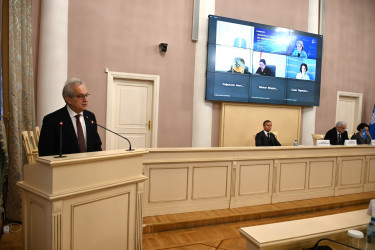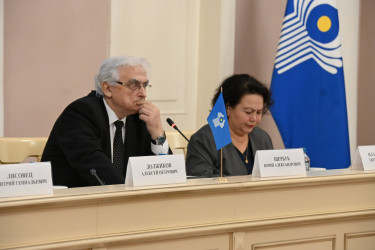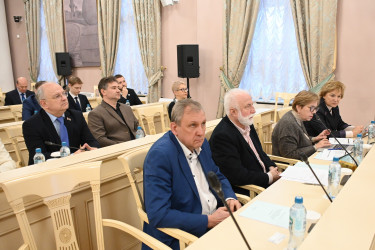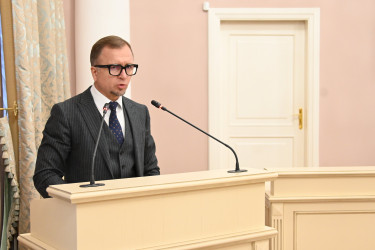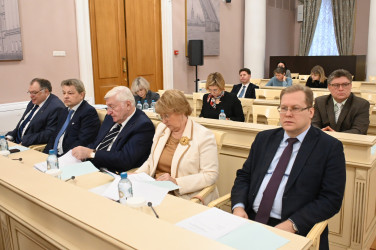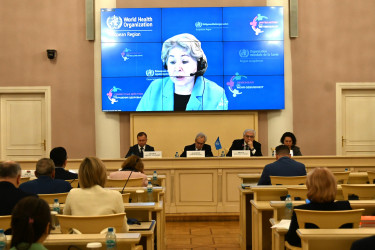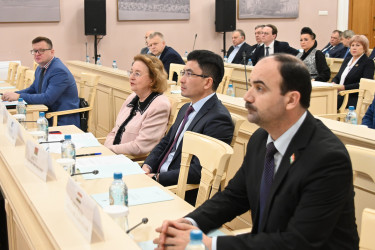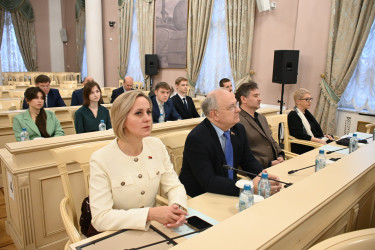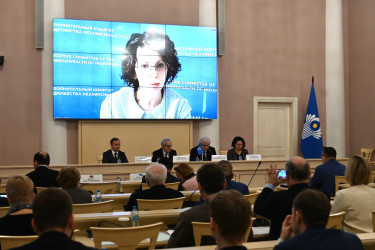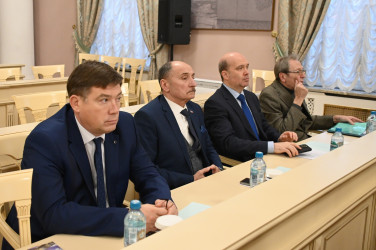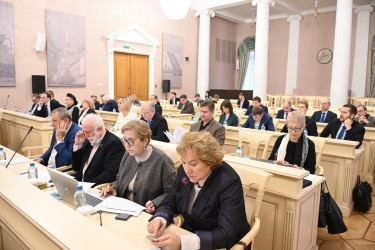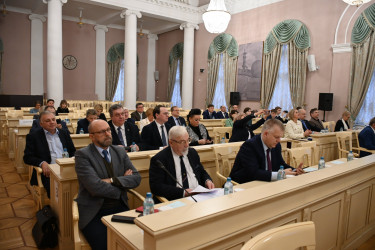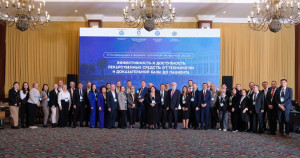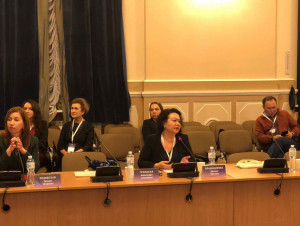Experts Discussed Digital Transformation of Public Administration Systems in Healthcare in CIS Countries
12 December 2024
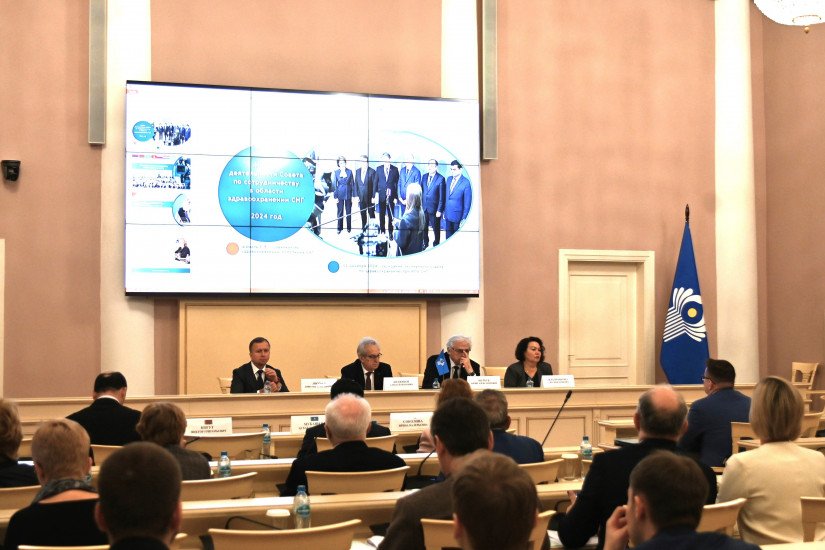
A meeting of the IPA CIS Expert Advisory Board on Public Healthwas held in the Tavricheskiy Palace. The participants discussed the realities and prospects of digitalization of healthcare for the Commonwealth.
The meeting was opened by Chair of the IPA CIS Expert Advisory Board on Public Health, Academician of the RAS Yuri Sherbuk.
Deputy Head of the IPA CIS Council Secretariat Aleksey Dolzhikov noted that the Assembly payed serious attention to legal support for the digital transformation of management systems. About 30 Model Laws on digitalization issues have been adopted, including a Model Law on Digital Health Care in the CIS Member Nations developed on the initiative of the Expert Advisory Board.
“Today, the event is attended by representatives of the Republic of Azerbaijan, the Republic of Belarus, the Republic of Kazakhstan, the Russian Federation, the Republic of Tajikistan and the Republic of Uzbekistan - members of our Expert Advisory Board: MP’s, representatives of the expert and academic communities. This confirms that at each of its meetings, the Advisory Board considers the most relevant, problematic, extremely important aspects of the work of the health system and strengthening the health of our fellow citizens,” - the Deputy Head of the Secretariat stressed.
Advisor to the Governor of St. Petersburg Dmitriy Lisovets made a welcoming speech.
Regional Advisor on Sub-regional partnerships of the Division of Country Support and Partnerships at the WHO Regional Office for Europe Bakhtygul Karriyeva addressed the participants via videoconferencing. In her opinion, it was necessary to create and apply strategies that optimize the work of physicians, reduce their unnecessary workload and fill gaps in access to medical care using machine learning, robotics, telemedicine and digital applications.
Within the framework of the meeting, an information session on “Development of national evidence bases in healthcare in the CIS countries in the context of digital transformation of public administration systems” was held.
Advisor of the Department for Humanitarian Cooperation, General Political and Social Problems of the CIS Executive Committee Elena Shamal informed about the results and work plans of the CIS Advisory Board on Cooperation in the Field of Public Health.
Three basic organizations of the CIS Member Nations in the field of healthcare have been established. The preparation of planned measures for the implementation of the Year of Health Protection in 2026 continues.
Head of the IPA CIS working group on the development of the Draft Model Law on Digital Health Care, Director of the Institute of Digital Medicine of the Sechenov First Moscow State Medical University of the Ministry of Health of the Russian Federation Georgy Lebedev spoke about the application of artificial intelligence technologies, namely, the prospects of using large language models (LLM) in medicine.
LLM can be used to analyze medical data, make diagnoses, and suggest optimal treatments. This can significantly speed up the diagnostic process and improve its accuracy. With these models, doctors will be able to receive up-to-date information and recommendations based on a large amount of data.
Digital healthcare in the CIS countries and a unified digital healthcare platform were the subject of a report by Director of the Centre for Regional Economics and Interbudgetary Relations of the Financial University under the Government of the Russian Federation, PhD in Economics Pavel Stroev.
An important step in the transition to digital technologies is the development of a national scientific and educational platform that will unite all participants in the healthcare sector. The platform will make it possible to collect, consolidate and analyze information, research results and clinical trials, which will help improve the quality of medical care and healthcare management.
The draft Recommendations on the Methodology of Digital Transformation in the Field of Public Administration of National Health Systems of the CIS Member Nations were presented to the audience by Director of the Independent Institute of Social Innovations Larisa Popovich.
Digital transformation in healthcare management consists of introduction of digital technologies to improve the efficiency and quality of medical services. It combines digital technology, data analytics and innovation to better manage service delivery. Benefits include cost savings, increased accessibility of medicine and improved quality. The main obstacles are staff training and financial costs.
Chair of the Commission on Development of the Principles of Bioethics and Evidence-Based Medicine at the IPA CIS Expert Advisory Board on Public Health, Head of the Endocrinology Department of the of Advanced Training and Retraining of Healthcare Personnel of the Belarusian State Medical University Larisa Danilova informed about the methodology of common principles and approaches for conducting system analysis and developing clinical recommendations in the CIS countries.
The methodology provides for the unification of disease registers and the creation of a single digital platform for the analysis and evaluation of the effectiveness of medicines in the CIS countries. It is also planned to develop national evidence bases in healthcare, bioethics and biosafety, and coordinate the development of common principles for clinical recommendations and system analysis.
Research Director of the Mechnikov Research Institute of Vaccines and Sera, Head of the Department of microbiology, virology and immunology of the Institution of Public Health of the Sechenov First Moscow State Medical University, RAS academician Vitaly Zverev spoke about the draft Model Recommendations on Preclinical and Clinical Studies for the Commonwealth countries.
Deputy Chair of the Board at the Salidat Kairbekova National Research Center for Health Development of the Ministry of Health of the Republic of Kazakhstan Adlet Tabarov reported on the high degree of readiness of the draft Model Recommendations on the Assessment of Healthcare Technologies for the CIS countries.
The Expert Advisory Board will address the IPA CIS Permanent Commission on Social Policy and Human Rights with a proposal to include these Recommendations in the Long-Term Plan of Model Law Making in the Commonwealth of Independent States for 2023–2025.
Deputy Director of an international non-profit organization the Eurasian Cooperation on Clinical Guidelines and Development of National Health Karina Moskalenko presented the draft Model Recommendations on the Assessment and Management of the Quality of Medical Care in the CIS Member Nations.
Executive Director of the Association for Directors of Institutes of Oncology and Radiology of the CIS and Eurasia (ADIOR CIS and Eurasia), head of the Center for Laser and Photodynamic Diagnostics and Therapy of Tumors at the Herzen Moscow Oncology Research Institute Elena Filonenko spoke about the draft Model Recommendations for the Creation of Patient Registries in the States of the Region.
Member of the IPA CIS Expert Advisory Board on Public Health, Director of the Medical Higher School of Russian State Social University Sergey Cherkasov spoke about the family of international classifiers as the basis for the formation of national evidence bases in healthcare.
Director of the Eurasian Cooperation on Clinical Guidelines and Development of National Health Sergei Savashinsky shared the results of the fourth expert session on the development of a Model Law pn Medical Supplies in the CIS Member Nations.
The participants of the expert sessions made a total of more than 100 proposals to the draft of the specified Model Law.
He also informed about the work plans of the International Expert Academic Working Group on Development of National Evidence Bases in Public Health, Bioethics and Biosafety of the CIS Member Nations and the Commission on Development of the Principles of Bioethics and Evidence-Based Medicine at the IPA CIS Expert Advisory Boardon Public Health for 2025.
Sergey Savashinsky noted that the involvement of advisory institutes in the Expert Advisory Boardhad improved model legislative activity in the field of health protection.
The next meeting is scheduled for March 2025.


